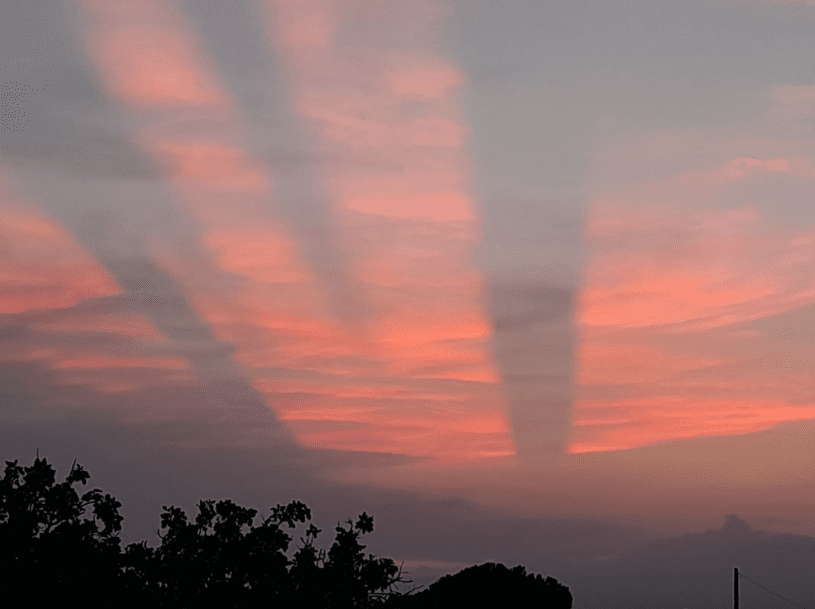Anthony Papagiannis
Thessaloniki, Greece
 |
| Sunset. Photo by Anthony Papagiannis |
The upper half of the face I could see behind the Covid-dictated mask did not tell me much, but the surname she gave rang a clear bell. I had seen several members of a family of the same name in the past, and looking into the computer registry I recited them to her. “My father, my sisters,” she said, until I reached her own record. We had met before after all, the last time fourteen years earlier. I dug out my old hand-written notes. “You were in high school in those distant days,” I said, having confirmed the address and telephone number—they had not changed, she was still living with the parental family. “I am back in school now, as a teacher,” she replied. I riffled through the file: nothing significant, just a number of straightforward respiratory infections, no chronic problems, no smoking or other risk factors.
And no current symptoms either. She only needed a health certificate for a renewal of her annual school appointment. After the routine systems review and physical, I did her paperwork and we chatted about her work experience so far. She had been island hopping; not as a tourist but as a nomadic professional. In keeping with the usual work pattern of her colleagues, she had held a number of annual postings as replacement teacher in remote areas of the country, mostly in the Aegean Islands, in patient anticipation of a permanent appointment. I told her that a nephew of mine had recently achieved that after thirteen years of wandering around Greece. “Well, I am almost there,” she replied cheerfully. I wished her every success, mentally congratulating her for her optimism. “Give my regards to your father,” I said as she was leaving. “Sure,” she said, and was gone until next time.
It is always a small pleasure and a source of professional satisfaction to be remembered and revisited by patients after many years, especially if nothing serious brings them back. Of the thousands of patients I have seen over the years, only a small fraction is on regular follow-up. I know of many that have died—in fact, I keep a separate file with their details, a “personal cemetery” as the famed French surgeon René Leriche used to call it—but the fate of a large majority remains unknown to me. Presumably their old problems did not warrant prolonged observation or regular visits, or some other trouble may have sent them elsewhere. It is nice to have some of them come back and make contact again. Naturally, after the initial joy I notice the changes that time has brought in them, and realize that all those years have also left their mark on me. A sobering reminder, if one were needed, that the world and all its inhabitants are in constant flux and transit.
Such reunions also hide occasional surprises, for both the physician and the patient. A while ago, a goddaughter of mine announced her forthcoming engagement. “Who is the lucky fellow?” I inquired. She gave me a rather unusual name. I had a feeling that I had heard it before, and a perusal of my practice registry confirmed my vague recollection. “Is he a fireman by any chance?” I asked her. “No, he works with the police,” came the answer. When I met him a few days later, I asked him the same question. “Yes, I did a spell in the fire service, but that was several years ago,” he said. “Then we have met before,” I said, much to his astonishment. He could not recall the visit: he was just months out of school in those days, and had been led to me by his parents for some minor ailment. And now our widely divergent life paths were crossing again under different, and more agreeable, circumstances. Such is life in all its rich diversity.
ANTHONY PAPAGIANNIS, MD, MRCP(UK), DipPallMed, FCCP, is a practicing pulmonologist in Thessaloniki, Greece. He graduated from the Aristotle University of Thessaloniki Medical School. He trained in Internal Medicine in Greece and subsequently in the United Kingdom, and specialized in Pulmonary Medicine. He also holds a postgraduate Diploma in Palliative Medicine from the University of Cardiff, Wales, United Kingdom. He is a postgraduate instructor in palliative medicine in the University of Thessaly, Larissa, Greece. He also edits the journal of the Thessaloniki Medical Association, and blogs regularly.
Summer 2021 | Sections | Doctors, Patients, & Diseases

Leave a Reply